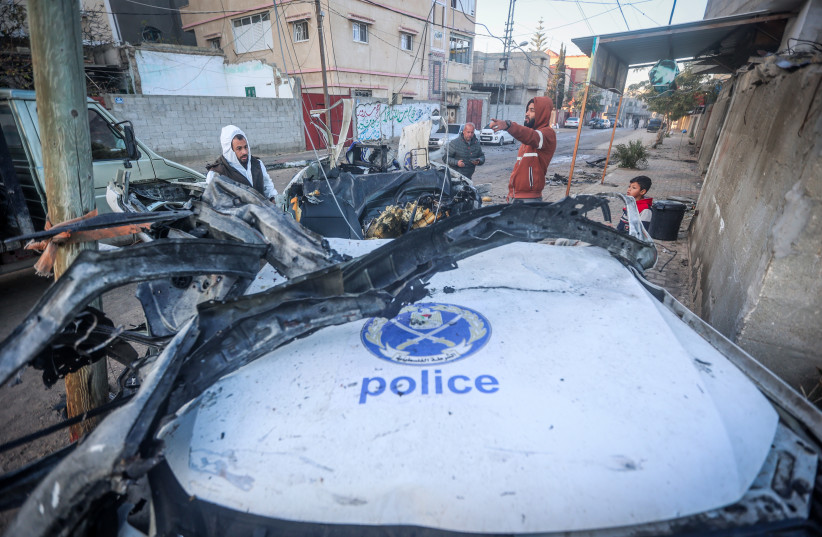The United States would not support an IDF military operation in Gaza’s Rafah near the Egyptian border, the White House warned, as US Secretary of State Antony Blinken wrapped up his two-day visit in Israel and the war cabinet met Thursday night to see if the hostage talks could be salvaged.
“A military operation would be a disaster” for the more than million Palestinians who have sought refuge there “and it’s not something that we would support,” US National Security Council spokesperson John Kirby said.
He noted, however, that they have not seen “plans that would convince us that they are imminently going to conduct any military operations in Rafah.”
Kirby’s sharp statement reflected the tensions between Israel and the US on humanitarian issues around the Gaza war, which were also reflected in Blinken’s visit, his fifth to the region.
After meeting with Blinken on Wednesday, Prime Minister Benjamin Netanyahu told reporters that the IDF would “soon go into Rafah, Hamas’s last bastion. They will do so, as they have done up to now, by providing the civilian population safe passage to safe zones.”

Kirby said that without property planning, it would be impossible for the IDF to operate there without harming civilians.
“Blinken in his meetings with the Israeli leaders, the prime minister, and the war cabinet made clear our concerns,” he said. “I am reiterating them here from the podium.”
He stressed that overall the Biden administration supported Israel’s military operation against Hamas and would make sure “Israel has what it needs to defend itself.”
Blinken had headed to the Middle East as Israel awaited a response from Hamas on its proposal for the terms of a deal to free the remaining 136 hostages held in the enclave, out of the 253 who were seized on October 7.
With hopes of advancing the deal, he had made stops in Egypt and Qatar, the two countries that are mediating the agreement.
Hamas issued its response Wednesday when Blinken was in Israel, setting out terms that Netanyahu called delusional and rejected.
But the rejection left open the possibility of additional talks and counter-proposals, in a process that is likely to be more protracted than Israel and the US had hoped.
“Nothing is done until everything is done,” Kirby said. “Negotiations are ongoing. We are optimistic that we will get a deal in place,” he stated.
Hamas's threat to Israel
In Tel Aviv, the war cabinet met to see how it could move the situation forward. The major sticking points remained constant, with Hamas insisting on a permanent ceasefire and Netanyahu standing firm on the existential necessity of Israel continuing its military campaign until it had destroyed Hamas.
On Blinken’s agenda was increased humanitarian aid for Gaza, including a plan to get assistance into the northern part of the enclave by opening the Erez crossing, which before the war had not been used for the transportation of goods.
He also discusses plans for Gaza once the war ended and the importance of moving toward a path for a time-bound two-state resolution to the conflict.
The US is under pressure to press Israel to put in place an immediate permanent ceasefire. Jordan’s King Abdullah is expected to visit the White House on February 12, as part of a trip to North America and Europe to press for a permanent ceasefire.
The White House said Biden and King Abdullah would “discuss the ongoing situation in Gaza and efforts to produce an enduring end to the crisis.
“Towards that end, the two leaders will discuss US efforts to support the Palestinian people including through enhanced humanitarian assistance into Gaza and a vision for a durable peace to include a two-state solution with Israel’s security guaranteed.”
Biden is also expected to host German Chancellor Olaf Scholz on Friday, where they will also talk about the Israel-Hamas war.
While in Israel, Blinken met with Netanyahu, Defense Minister Yoav Gallant, opposition leader Yair Lapid (Yesh Atid) and ministers Benny Gantz and Gadi Eisenkot (National Unity), as well as with relatives of some of the hostages.
Gantz told Blinken on Thursday, “The most urgent issue is, of course, to find ways to bring back the hostages. Once that can be done, then peace can be achieved.”
Meanwhile, the US said it is aware of reports that two Americans in Gaza were detained by Israeli forces in a raid early on Thursday and is seeking more information, the State Department said.
The department did not identify the two citizens, citing privacy concerns.
But the family of US-Palestinian dual nationals Hashem Alagha, 20, and Borak Alagha, 18, said the two brothers were detained in a raid on a home west of Khan Yunis on Thursday morning.
Four other relatives were detained, including the brothers’ Canadian father and an uncle who is mentally disabled, according to the brothers’ cousin, Yasmeen Elagha, who lives near Chicago.
In a statement, a spokesperson for the State Department said it was “aware of reports of [the] detention of two US citizens in Gaza and [was] seeking additional information.”
The IDF had no immediate comment.
Reuters contributed to this report.
